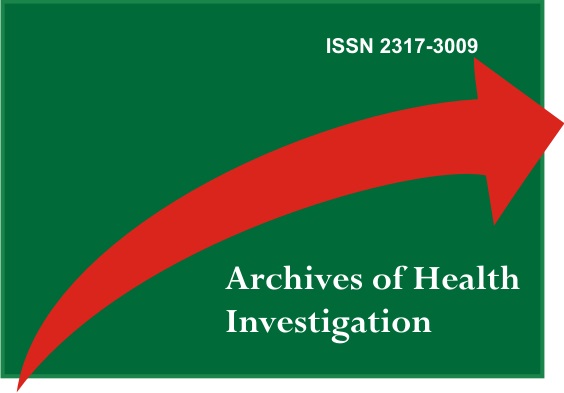An uncommon case of apical dentoalveolar abscess of sinusal origin
DOI:
https://doi.org/10.21270/archi.v10i2.4674Palabras clave:
Otorrinolaringología, Endodoncia, DiagnósticoResumen
Introduction: Apical dentoalveolar abscesses associated with sinusitis are very uncommon and may expose patients to unfavorable outcomes. Case-report: A 25-year-old female patient sought medical care due to severe, recurrent, long-term frontal facial pain and symptom relief through analgesics. A tomographic examination of the skull did not identify any pathological cerebral alterations. It did, however, evidence diffuse and irregular mucous thickening of all nasal cavities. The patient was referred to an otorhinolaryngologist, who diagnosed the condition as bilateral chronic inflammatory rhinosinusopathy. A rhinoscopy was performed and antibiotic associated with corticoid was prescribed. After the procedure, sinus infection diffusion to the dental tissues was observed, and the patient required emergency dental care due to diffuse facial cellulitis and swelling associated to tooth 26. Due to the absence of clinical signs indicative of carious infection, the condition was diagnosed as an uncommon case of acute dentoalveolar abscess of sinusal origin. After endodontic access for initial drainage, chemical-mechanical preparation of the root canals was performed, in two sessions. After 30 days, a tomography of the sinuses was performed, and results indicated a significant improvement of the infectious process. Due to the rarity of the case presented herein, it is of significant importance to understand the clinical, radiographic and protocol aspects of the case, in order to attend similar cases, as well as the joint action of the dental surgeon and the otorhinolaryngologist for rhinogenic and odontogenic infection management.
Descargas
Citas
Maillet M, Bowles WR, McClanahan SL, John MT, Ahmad M. Cone-beam computed tomography evaluation of maxillary sinusitis. J Endod. 2011;37(6):753-57.
Nascimento EH, Pontual ML, Pontual AA, Freitas DQ, Perez DE, Ramos-Perez FM. Association between Odontogenic Conditions and Maxillary Sinus Disease: A Study Using Cone-beam Computed Tomography. J Endod. 2016;42(10):1509-15.
Nunes CA, Guedes OA, Alencar AH, Peters OA, Estrela CR, Estrela C. Evaluation of Periapical Lesions and Their Association with Maxillary Sinus Abnormalities on Cone-beam Computed Tomographic Images. J Endod. 2016;42(1):42-6.
Drumond JP, Allegro BB, Novo NF, de Miranda SL, Sendyk WR. Evaluation of the Prevalence of Maxillary Sinuses Abnormalities through Spiral Computed Tomography (CT). Int Arch Otorhinolaryngol. 2017;21(2):126-33.
Lana JP, Carneiro PM, Machado Vde C, de Souza PE, Manzi FR, Horta MC. Anatomic variations and lesions of the maxillary sinus detected in cone beam computed tomography for dental implants. Clin Oral Implants Res. 2012;23(12):1398-403.
Mehra P, Murad H. Maxillary sinus disease of odontogenic origin. Otolaryngol Clin North Am. 2004;37(2):347-64.
Cymerman JJ, Cymerman DH, O'Dwyer RS. Evaluation of odontogenic maxillary sinusitis using cone-beam computed tomography: three case reports. J Endod. 2011;37(10):1465-69.
Lee KC, Lee SJ. Clinical features and treatments of odontogenic sinusitis. Yonsei Med J. 2010;51(6):932-37.
Guerra-Pereira I, Vaz P, Faria-Almeida R, Braga AC, Felino A. CT maxillary sinus evaluation - a retrospective cohort study. Med Oral Patol Oral Cir Bucal. 2015;20(4):e419-26.
Brook I. Sinusitis of odontogenic origin. Otolaryngol Head Neck Surg. 2006;135(3):349-55.
Drago L, Vassena C, Saibene AM, Del Fabbro M, Felisati G. A case of coinfection in a chronic maxillary sinusitis of odontogenic origin: identification of Dialister pneumosintes. J Endod. 2013;39(8):1084-87.
Kim JW, Cho KM, Park SH, Park SR, Lee SS, Lee SK. Chronic maxillary sinusitis caused by root canal overfilling of Calcipex II. Restor Dent Endod. 2014;39(1):63-7.
Karunasagar A, Garag SS, Appannavar SB, Kulkarni RD, Naik AS. Bacterial Biofilms in Chronic Rhinosinusitis and Their Implications for Clinical Management. Indian J Otolaryngol Head Neck Surg. 2018;70(1):43-8.
Mahdavinia M, Engen PA, LoSavio PS, Naqib A, Khan RJ, Tobin MC et al.The nasal microbiome in patients with chronic rhinosinusitis: Analyzing the effects of atopy and bacterial functional pathways in 111 patients. J Allergy Clin Immunol. 2018;142(1):287-90.e4.
Nair PN. Pathogenesis of apical periodontitis and the causes of endodontic failures. Crit Rev Oral Biol Med. 2004;15(6):348-81.
Bell GW, Joshi BB, Macleod RI. Maxillary sinus disease: diagnosis and treatment. Br Dent J. 2011;210(3):113-18.
Chavez de Paz LE. Redefining the persistent infection in root canals: possible role of biofilm communities. J Endod. 2007;33(6):652-62.
Larsen T, Fiehn NE. Dental biofilm infections - an update. APMIS. 2017;125(4):376-84.
Ottaviani G, Costantinides F, Perinetti G, Luzzati R, Contardo L, Visintini E et al. Epidemiology and variables involved in dental abscess: survey of dental emergency unit in Trieste. Oral Dis. 2014;20(5):499-504.
Hibi A, Amakusa Y. Intracranial subdural abscess with polymicrobial infections due to frontal sinusitis in an adolescent: life-threatening complication of a common disease. Clin Case Rep. 2018;6(3):516-21.


